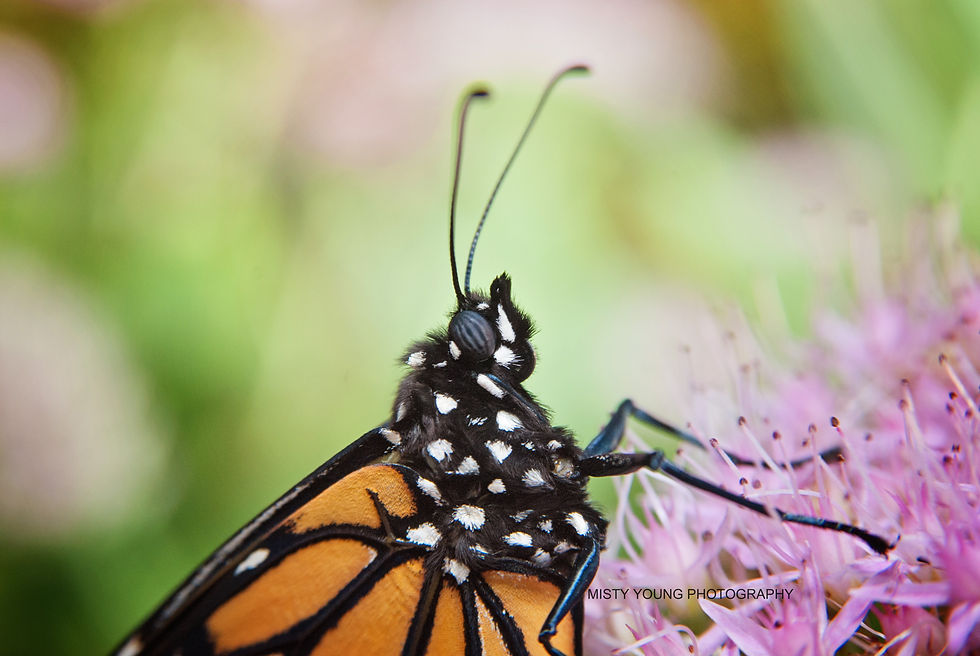Butterfly, Butterfly, where are you going?
- Misty
- Aug 25, 2019
- 3 min read
Migration! With the peak of fall migration upon us, we should start seeing many more monarchs flying around all of our beautiful flowers that are waiting for them! They will need lots of fuel for their incredibly long journey. It is so important for them to have access to plenty of food along the way. (and, if we have milkweed they may leave us some eggs!) After all if they can't eat, they can't fly.
It may surprise you to learn that butterflies migrate. (Not all butterflies make an incredible journey, but that is a topic for another day.)

Why do monarchs migrate?
There are actually 2 reasons. Monarchs rely on nectar as their food and milkweed for their babies to eat. In northern states, and their furthest destination, Canada, flowers die off during the winter, the Monarchs have no access to food after the fall weather turns cold and when the flowers and plants die off. This usually occurs in early October. Also, the small bodies of the butterflies are not designed to withstand the plummeting winter temperatures that are sure to come. (Monarchs are not the only species of butterfly that migrate, There are many other butterflies and insects, that also fly to warmer temperatures during winter) Each fall, millions of Monarchs take flight for warmer climate.

MIDPOINTS AND PEAKS OF THE MONARCH MIGRATION BY LATITUDE
Latitude Midpoint Peak in monarch abundance
49 26 August 18-30 August
47 1 September 24 August - 5 September
45 6 September 29 August - 10 September
43 11 September 3 - 15 September
41 16 September 8 - 20 September
39 22 September 14-26 September
37 27 September 19 September - 1 October
35 2 October 24 September - 6 October
33 7 October 29 September - 11 October
31 12 October 4-16 October
29 18 October 10-22 October
27 23 October 15-27 October
25 28 October 20 October - 1 November
23 4 November 27 October - 8 November
21 11 November 3-15 November
19.4* 18 November 10-22 November
(The above information is provided by Monarchwatch.org)
Monarchs go to Mexico for the winter, they also fly to some parts of southern California, where the weather is warm year round. Over the winter, in Mexico, they will hibernate in oyamel fir and pine trees. In California, the Monarchs will hibernate in eucalyptus trees.
The Monarchs fly all the way to the Central Mexican Mountains. They will rest there from November to March, before they start their long journey back up to Canada. There are a few reserves and tourist areas you can witness this incredible event. El Rosario, which is located in Ocampo, Mexico (Sadly it has been impacted greatly by deforestation, but the butterfly sanctuary and tourism is helping to change this), Cerro Pelon and Sierra Chincua in Angangues are other options as well.
Monarchs usually live from 2-6 weeks, with the exception of being part of the migratory generation. It actually takes 4 generations for Monarchs to go from Mexico to Canada in the spring, and 4 generations to make the journey back in the fall. The 4th generation that over winter in Mexico live for 6-8 eight months, they will start the journey north, lay their eggs, and start the whole process over again.

It is a little astonishing that such a little creature could travel as far as north as Canada and as far south as Mexico! With an average wingspan of 3.5 to 5 inches, this tiny flying beauty can travel as much as 50-100 miles per day! (Although the record is actually 265 miles in one day) It's a good thing that they can travel so far in a single day, because their overwintering destination is as much as 3000 miles away from their starting point.
Are you ready? It's almost time to get your milkweed seeds planted for next year, so you can start your very own Monarch garden ready for their return in the spring!
Safe travels little ones! Or as our daughter says "bye, bye, butterfly."







Comments